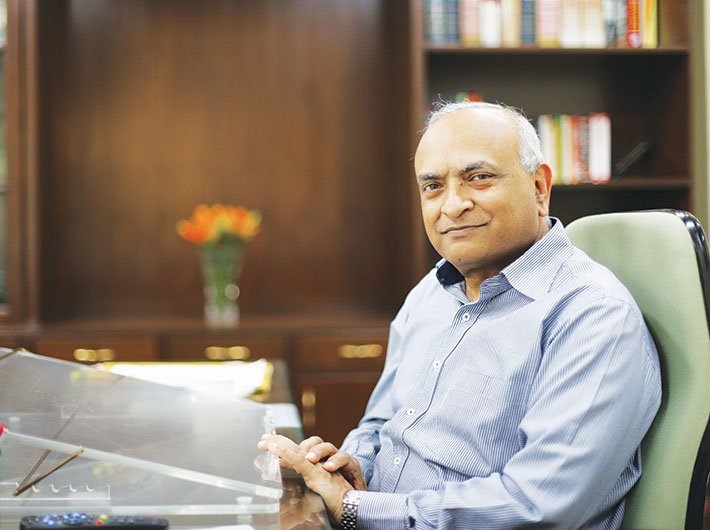Radha Krishna Mathur, chief information commissioner, talks about the functioning of the central information commission, RTI applications and more
The functioning of a national commission, be it NHRC, NCSC or NCST, depends on its head. Being the chief information commissioner (CIC), what is your vision for CIC? And what has been your experience so far?
The chief information commissioner and ten information commissioners (ICs) are creation of the Act. What the Act defines is general superintendence and administration to be looked after by the chief. So far as the adjudicatory part is concerned, each one acts solely in the commission. Each IC has his/her own case and is totally independent. But here the chief can make a difference in really two aspects – on the administrative front you can make better and faster hearing, and reduce pendency. Second, on the adjudicatory front commissioners can sit and discuss provisions of the Act, and its better implementation. To improve the quality of order is of significant importance to us. The Act is designed to deliver a certain outcome. Outcomes which are laid down by the Act have to be substantially achieved. There are practical steps for this. For any court the main objective is to check what the Act lays down gets implemented. It obviously cannot be a toothless place. Definitely, the focus area is to minimise pendency and do more quality work. Yes, whatever is being said doesn’t get done at times.
Read: CIC’s changing status quo
Doesn’t it question the credibility of the CIC?
Not really. It doesn’t make for a case that anybody could question the credibility of the commission. It is very senseless. Such cases don’t happen in a very large number, even at the inception level. It happens probably because of a PIO who may not be sincere.
If we segregate total complaints received by CIC, what percentage falls under personal and public purposes?
We haven’t analysed complaints in such a manner. But a fairly high percentage of complaints belong to personal category. Personal complaints tend to be regarded as an abuse of RTI, which is definitely not the case. The Act permits all kind of personal complaints and complaints which serve larger public interest. Seeking information is not the abuse of RTI.
Can you give examples where CIC sensed that RTI was being abused?
Can you name any law which is not abused to an extent? RTI is no better or worse than any other Act. In my personal experience, this is very miniscule in terms of RTI. I could say less than three percent of appeals can be put under the category of RTI abuse.
CIC has a pendency of more than 34,000 cases. Why is it struggling in timely disposal of cases? And how can this problem be tackled?
In the current year [since January] we have disposed of 5,500 cases. The way we do hearing has an important role to play. Most of the hearing is done through video-conferencing across the country. I cannot ask someone from Kanyakumari to come for a hearing. I have to look at the appellant’s convenience also. Through video-conferencing we have to ensure the respondent and the appellant are available at the same time. This exercise naturally takes time. It is the nature of the hearing, which is the single biggest issue behind the pendency of cases.
One cannot ignore that the rejection rate of application has also increased. From 7.70 percent in 2012-13 to 8.39 percent in 2014-15, is the motive behind RTI getting diluted?
I go by what I receive and what I see. In 2014-15, 7.55 lakh fresh RTIs were filed, whereas in 2015-16, 9.77 lakh were filed. Increase in the number shows a certain degree of confidence in RTI. It wouldn’t have been possible if applications were getting rejected. Sharing the latest data with you, in 2015-16 the rejection rate has come down to 6.6 percent. It is not an abnormal percentage and it is not a high number. Applications are rejected generally by a lower level of PIO or CPIO because he is unable to give any reply to such applications.
Some public authorities are in the habit of misusing section 6(3) of the Act by unnecessarily transferring RTI pleas to other offices. Your comment?
It happens. Each criticism has some element of truth. I also come across such cases as second appeals. But these are very few cases. We do take actions when such a thing is happening. We penalise the concerned person and put other mandatory penalties. There is no analysis or an exact number of such cases because we don’t see it every time. But we have information about the total amount collected through penalising the officers.
How many times has CIC penalised PIOs for not providing information?
In 2015-16, we collected Rs 8.75 lakh through 350 cases, where PIOs and CPIOs failed to follow the procedure. As per my calculations, out of the total cases, only one percent fall under this category.
Why is there a decline in the number of public authorities (PA) registered with the commission?
In 2013-14, there were 2,276 and in 2015-16, there were 2,024. Obviously, the number has gone down. Certainly, the government and its agencies expand! The biggest contributor to these figures is Lakshadweep; it declared every small department as PA. But there is an obligation for every PA to appoint an information officer and every department would not be a PA. So, figures fluctuate on the basis of these parameters. Also, it is being rationalised by the ministry as to which department they plan to register under RTI, like the ministry of finance can declare the CBDT a PA or not. The commission takes action only when it receives a complaint through an RTI.
Where do you see CIC heading when its order gets challenged in a high court or the apex court?
It has nothing to do with us. Sometimes we are also a party in the case. It has been made very clear by the former commissioners that we will not defend our decision in the court. But sometimes there are cases with the SC where people have made personal attack on the commission and have questioned its credibility. CIC is an adjudicatory body, not looking at personal problems, but addresses issues of larger public interest. Why should I doubt a court’s decision which will always be in public interest!
But there are cases where CIC orders are being violated. What action is CIC supposed to take in case of non-compliance of its order?
Penalising is one way to take action. The authority can receive a disciplinary action in case of not giving any information. We ensure public authorities provide compensation in cases where the applicant fails to get information, which could have been easily provided. Generally there are three sets of action we take: penalty, penalty for tinkering and compensation in case of failure to give information.
Do you think private companies in public-private partnerships (PPPs) should be brought under the RTI Act?
Yes. PPP is one area where a whole lot of private companies have overtaken public enterprises in handling development projects. For example, toll road constructions. Now, it is something which impinges on our daily lives, of every citizen. The information related to this project should, therefore, be available.
Asking public offices to maintain proper websites providing information in public domain is also a task of CIC. Why is there no seriousness to it?
Putting information on websites falls under proactive disclosure under section 4 (1) (b) of the RTI Act, where public offices have to put a certain set of information on their website. The Act, however, is non-specific on this. All institutions should proactively disclose information to bring the rate of RTI application down. Recently, we started a ‘Desktop study’ to check how many government websites have followed 17 declarations [as mentioned in the Act]. We will rank the websites through this study. It is likely that the exercise will be completed in next two to three months.
archana@governancenow.com
(The interview appears in the April 16-30, 2017 issue of Governance Now)

